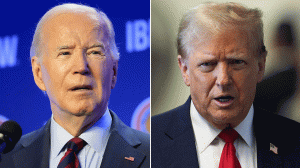A judge this week ordered Michigan Republican Party Chairperson Kristina Karamo and others to pay more than $58,000 in legal fees incurred by the Detroit clerk’s office to fight a lawsuit they filed challenging absentee voting in the city.
In an order signed Monday, Wayne County Circuit Court Judge Timothy Kenny said the Oct. 26 lawsuit in which Karamo was the lead plaintiff was “rife with speculation, an absence of facts and a lack of understanding of Michigan election statutes and Detroit absentee ballot procedures.”
At the time, Karamo was the Republican nominee for secretary of state, a position that serves as Michigan’s top election official. Two weeks after the suit was filed, Karamo lost to Democrat Jocelyn Benson by 14 percentage points before being elected the state GOP chairperson in February.
“Plaintiffs merely threw out the allegation of ‘corruption in Detroit’ as the reason for disregarding the Michigan Constitution in this state’s largest city,” Kenny wrote in his order. He ordered the plaintiffs to pay the $58,459 in legal fees incurred by the Detroit clerk’s office.
Email requests seeking comment were sent Tuesday to Karamo and the state GOP.
Karamo and the others sued to try to force Detroit residents to vote in person or go to the city clerk’s office to get an absentee ballot.
They filed a lawsuit 13 days before the election, making a variety of allegations about how Detroit election officials review signatures on absentee ballots and monitor drop-off boxes. The lawsuit, among other things, also claimed the city was using “uncertified high-speed tabulators” to count votes.
Kenny dismissed the lawsuit the day before the Nov. 8 election.
“Despite plaintiffs’ arguments to ‘shed light in a dark place,’ they have failed dramatically,” the judge said at the time. “Over an eight-hour evidentiary hearing, no evidence of election law violations” was revealed.
Scroll down to leave a comment:





























